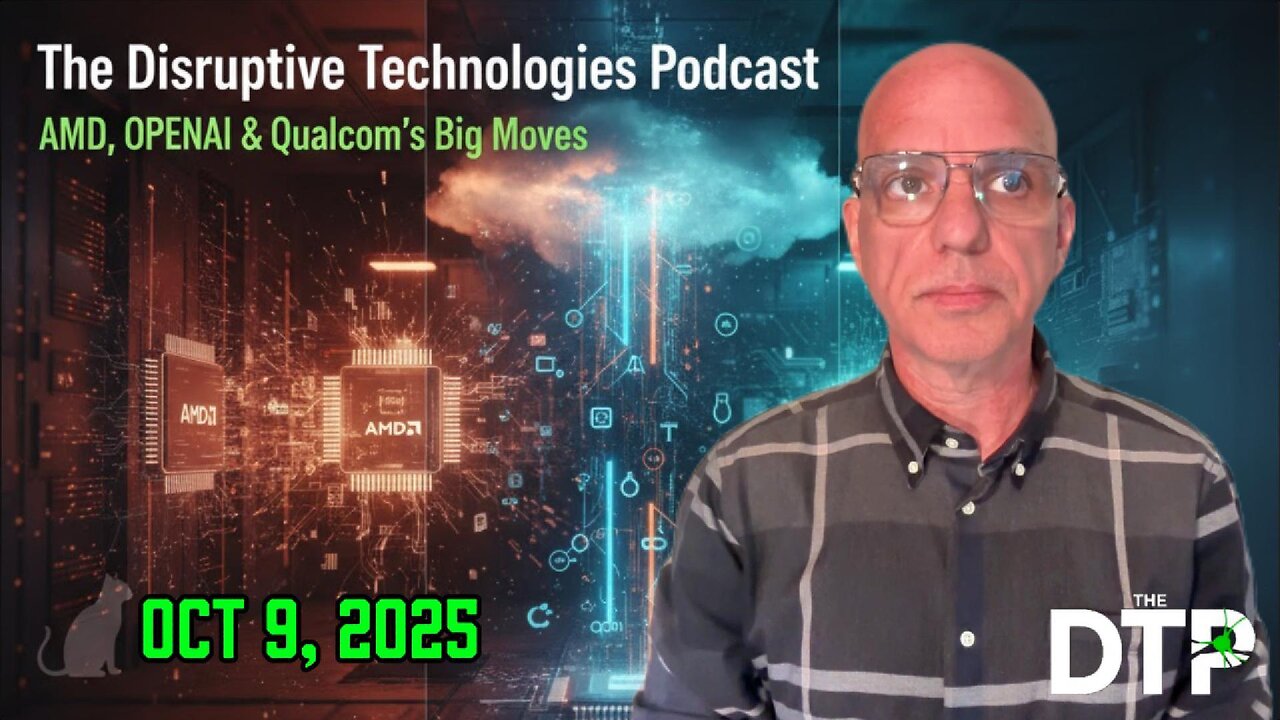Premium Only Content

Chip Wars & Sovereign Compute — AMD, OpenAI & Qualcomm’s Big Moves
Today, two titanic chip deals are reshaping who controls compute — and who controls power in tech.
I’m Nikodemus, and this is the Disruptive Technologies Podcast.
If you care about decentralized AI, hardware sovereignty, and where real control lies — then this episode is essential.
🧠 The Stakes: Compute, Control & Sovereignty
In the global tug‑of‑war over digital sovereignty, it’s not new laws that matter — it’s who owns the chips and who controls the infrastructure. The last few days may mark a turning point in that fight.
1. AMD vs Nvidia: The Cloud Chip Battle
On October 6, 2025, AMD and OpenAI announced a partnership: AMD will supply OpenAI with next‑gen Instinct MI‑series AI accelerators.
This threatens Nvidia’s near‑monopoly over AI chips — from A100s to H100s to B200s, and the lock‑in of CUDA remains their secret weapon.
But now, labs get options. AMD’s open‑source software stack, ROCm, gives transparency and portability — something locked CUDA never allowed.
Why it matters:
Controlling silicon means controlling who builds, scales, and owns. A multipolar compute world could break big tech’s grip — with more supply, lower costs, and real paths for startups and independent creators.
2. Qualcomm + Arduino: AI at the Edge
On October 8, 2025, Qualcomm acquired Arduino, the open‑source platform beloved by millions of developers.
Their first launch: the Arduino UNO Q — a “dual‑brain” board. One chip handles microcontroller tasks; the other, a Qualcomm Dragonwing QRB2210, runs Debian Linux plus on‑chip AI, vision, and audio.
The key: you get real, on‑device intelligence — no cloud required.
Why it matters:
Edge AI means resilience. Devices that work offline, preserve data locally, and stay truly in your control. And because Arduino commons stays open, developers keep the freedom to see, tweak, fork, or rebuild.
Two Fronts, One Fight
In cloud, AMD + OpenAI loosen Nvidia’s grip.
At the edge, Qualcomm + Arduino bring AI into your hands.
Both moves are market‑driven, not regulatory — powered by competition, not legislation.
The lesson: if you don’t control hardware, you don’t control innovation.
If this episode resonated, drop a like, share it with your network, and subscribe for more deep dives on technological sovereignty.
Thanks for listening to the Disruptive Technologies Podcast. Stay curious. Stay free. Stay disruptive.
-
 5:23
5:23
Buddy Brown
7 hours ago $0.57 earnedElon, Out Here Doin the LORD'S WORK! | Buddy Brown
10K5 -
 1:01:44
1:01:44
BonginoReport
4 hours agoWhat Do Newly Released Epstein Emails Prove? - Nightly Scroll w/ Hayley Caronia (Ep.176)
125K51 -
 13:09:22
13:09:22
LFA TV
1 day agoLIVE & BREAKING NEWS! | WEDNESDAY 11/12/25
211K45 -
 8:14
8:14
Jamesons Travels
9 hours ago $1.10 earnedGreen Beret Stopped Playing It Safe & Went AMERICA FIRST
22.1K8 -
 1:24:36
1:24:36
Kim Iversen
5 hours agoTrump Spent “Hours” With Epstein Victim — Possibly Blackmailed
107K152 -
 LIVE
LIVE
MattMorseTV
5 hours ago $28.07 earned🔴The House VOTES to RE-OPEN the GOVERNMENT.🔴
1,327 watching -
 10:25
10:25
Faith Frontline
9 hours agoDay in the Life of a First-Century Christian
16.2K1 -
 1:01:40
1:01:40
The Bryce Eddy Show
1 day ago $0.69 earnedJames Melton: Different Beliefs, Same Problems
15.1K1 -
 1:17:32
1:17:32
CopperheadRoadPodcast
1 day agoEPISODE #87 TATUM'S TRUTH ABOUT CANDACE'S LIES
10.1K15 -
 1:53:34
1:53:34
Redacted News
6 hours agoBREAKING! Trump Holding Emergency Epstein Meeting as House Votes to Release Epstein Files
163K159